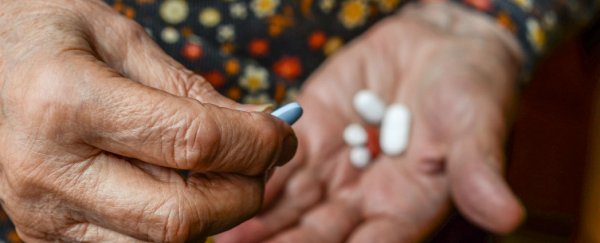A drug that's used to treat liver disease could slow the progression of Parkinson's disease, scientists in the UK have found. After seeing positive results in fruit fly experiments, the team hopes to fast-track the drug to the human trials phase, where it can be tested as a potential new treatment for a range of neurological diseases.
Called ursodeoxycholic acid (UDCA), the drug appears to mitigate the damage caused by a mutation in the LRRK2 gene - the single most commonly inherited cause of Parkinson's disease.
While scientists aren't entirely sure why this mutation leads to Parkinson's, they do know that it causes defects in the mitochondria of the brain's dopaminergic neurons - the main source of the hormone dopamine in the central nervous system. This can lead to life-altering symptoms such as slow slow and imprecise movement, chronic tremors, and muscular rigidity, which grow more severe over time.
"The treatment of fruit flies carrying the faulty LRRK2 gene with UDCA showed a profound rescue of dopaminergic signalling," one of the team, Chris Elliott from the University of York, said in a press release. "Feeding the flies with UDCA partway through their life slows the rate at which the fly brain then degenerates."
The team worked with fruit flies that had been engineered to not only have the LRRK2 mutation, but to manifest the effects through the progressive loss of vision. This allowed the team to study the degenerative effects of the mutation and the impact of the UDCA drug without having to measure the mental capacity of a fly. (Sorry flies, but you know.)
Publishing in the journal Neurology, the researchers describe how the flies carrying the mutation maintained their visual response when fed with UDCA. And what could potentially be really promising is the fact that the mitochondrial defects the drug appears to be acting on aren't just a key factor in the progression of Parkinson's disease, they're also a driving force in other neurological diseases such as Motor Neuron Disease. Because nerve cells are such heavy guzzlers of energy, defective mitochondria - nicknamed the 'powerhouses of the cell' - can have a devastating effect on brain function.
"Whilst we have been looking at Parkinson's patients who carry the LRRK2 mutation, mitochondrial defects are also present in other inherited and sporadic forms of Parkinson's, where we do not know the causes yet," said one of the team, Oliver Bandmann, professor of movement disorders neurology at the University of Sheffield. "Our hope therefore is that UDCA might be beneficial for other types of Parkinson's disease and might also show benefits in other neurodegenerative diseases."
The next step will be to test UDCA out in living animal models before getting the drug ready for human trials with Parkinson's patients. The hope is that because the drug has been in clinical use for decades, this process will be fast-tracked so they can find better treatments for people with Parkinson's in the coming years, not decades.
